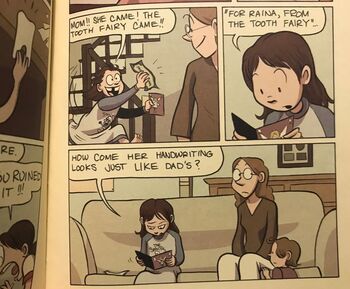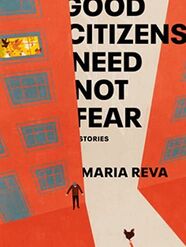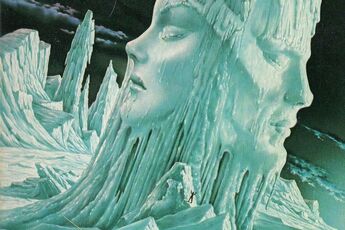Silver Wordsmith: An author's journey |
 My kids almost got wise because of this page My kids almost got wise because of this page
You know what, as long as it’s still January, I’m allowed to do “Best X of 2020” posts. My house, my rules. That said, it feels weird using the word “best” and “2020” in the same sentence. Very little about 2020 felt good, and I noticed that this December I wasn’t inundated with the Top Countdowns for the year as is normally the custom. My guess is people don’t have the appetite for it, which is understandable. It looks like I didn’t either seeing as how I hardly noticed anything missing. That said, I’ve been doing my Writing and Reading wrap-up posts since I started this blog, and I don’t see the need to skip this year. It’s healthy to reflect on anything good that happened last year, though sometimes it feels like getting blood from a stone. Apropos of that last statement, this has not been a great reading year for me. For one, I lost my prime reading time, which was on my commute to and from work, due to working exclusively from home, which in itself had its own plethora of benefits, but its side effects as well. The other reason being like many people I just wasn’t in the right headspace to pick up a book instead of doomscrolling for a few hours before completely slipping into despair. Nonetheless, there were a few highlights from what I did read last year, so let’s jump into those.
Most Fun Smile by Raina Telgemeier. This was somehow my fourth Telgemeier book even though it was her first bestselling graphic novel, but it also has a special place in my heart, having picked it up for my kids at the airport during a short business trip. Felt like a very on-point dad thing to do – grabbing something for the kids while I’m away. My dad travelled a lot starting around the time when I was my eldest’s age, and he would do the same thing for us as sort of compensation for being away from us for days and occasionally weeks at a time. The book was not ideal for my four year-old but with the six year-old now in kindergarten, the graphic novel hit on a lot of points that have become a part of his life, like teasing, bullying, making friends and changing friends. The endearing art also goes a long way to packaging this coming-of-age work for young minds, and I’ve been catching the eldest flipping through his other Telgemeier books at his leisure. Thanks, but Let’s Not Do This Again Man in the High Castle by Philip K. Dick. I’ve read a bit of Dick before, with A Scanner Darkly being my favourite (it has a fantastic film adaptation as well), and hearing a lot of good things about the television show, I thought I’d check this out. Boy, was this a lesson in setting proper expectations. Let’s just say, even without watching the show, I can tell this is nothing like the show. The Nazi victory in the Second World War is less the driving force of the plot but rather the backdrop for an exploration of colonialism, destiny and hope. It is incredibly slow-paced if one is looking for a big thriller-paced payoff and shies away from really exploring the inherent atrocities of living under Nazi and Imperial Japanese occupation. There’s a lot to like about this book if one focuses on what it is trying to say, and not what you thought it was going to try to say, and the colonialism critique through the eyes of the colonized colonizer alone makes the read worth it. Lesson learned though about judging a book by its adaptation. Honourable Mention I’m Not Sick, I Don’t Need Help! by Xavier Amador. This was part of my research dive for my first novel – a book who’s intended audience is families of those who suffer from schizophrenia with a focus on one of its most insidious symptoms – the inability to tell one is suffering from a mental illness despite all rational signs indicating so. Equal measures informative and heartbreaking, it strengthened my understanding of the disease, but left me with a heavy feeling and a renewed sympathy for those taking care of loved ones suffering from this terrible affliction. 
Most Influential
Good Citizens Need Not Fear by Maria Reva. One of the few times (if not the only time) I’ve ever pre-ordered a book because I was so excited by the prospect of reading it. It happened to arrive at the store just at the turn of the pandemic, which locked it up for a couple of months before I was able to get my hands on it. And when I did finally get a chance to go through it, it was well worth the wait. Not only was this a collection of short stories – the genre that launched my writing and which I still turn to from time to time – but it was also close to my heart in its setting. The series of interconnected stories follow a group of characters who at one point or another reside at a crumbling apartment block in Ukraine in the twilight years of the Soviet Union. It chronicles years I have lived through but was mostly too young to remember, though even for me that time forms an integral term of my early identity – political unrest, long lines for groceries, young parents not knowing what the immediate future will bring. It was a dying nation with a citizenry that had no choice but to live, and Reva’s short story collection captures this perfectly. It also illuminates for me a new perspective that I hadn’t spent enough time considering. As a third, or even fourth, generation Muscovite, there were certain privileges that my family had in the overall hierarchy of the Union, and I had rarely been forced to confront that colonialist reality in the way Reva’s satire made me do. So overall, the book was not only influential on me as a writer but as a person of Russian heritage as well. Honourable Mention Leviathan Wakes by James S. A. Corey (the first book in The Expanse series). I would be remiss if I didn’t mention an audiobook I listened to, mostly because I need to make my assertion that audiobooks are legitimate “reading” and I will fight anyone who suggests otherwise. My approach to this book was completely ass-backwards since I initially watched the first half of the first season of The Expanse and then, abandoned by the friends with whom I’d been watching, turned to the audiobook instead. I’m glad I did, because I’m not embarrassed to admit (that’s a lie, I’m really embarrassed by this) but I need more sci-fi on my reading list. For one, I’ve never had much of a yearning for hard sci-fi. I’ve always been a Star Wars, Babylon 5, Star Trek, space opera kind of guy with speedy interstellar travel, a whole host of alien races and a hint of the supernatural to keep things spicy. So The Expanse’s universe of limited technology, slow travel and murderous G-forces was not my regular cup of tea. That said there’s plenty to learned from someone else’s tea. It’s a great book, though it suffers from a diversity problem. The world is carefully crafted and believable and the terror of the supernatural element that is included is enhanced by this believability. Plus, since the travel and communication in my own story are far slower than any of the three works I mentioned, The Expanse offers me a lot of good tips. The adaptation seems pretty faithful too. Then again, that’s what I thought after the first couple of episodes of Altered Carbon, so don’t take my word for it. 
Best Book of 2020
Little Women by Louisa May Alcott. Could I not have a chosen a book written this century? Or at least, the previous century? No, no I could not have. With the new movie having come out at the end of 2019 and my wife reminding me that this was one of her favourite books growing up, it seemed like the perfect time to pick this up and I’m so glad I did. It’s so infrequently that a book comes a long and endears me to the characters so much that I feel they’re real, and that I will actually miss their presence when they’re gone. I can see why the book has stood the test of time after more than a century and a half, with strong feminist themes and the perfect picture of the rewards and trials of family bonds. I will say that I’m still (as my wife) reeling from the whole Jo and Laurie thing, and I’m even madder about who she ends up with, but the movie did such a fantastic job of shedding new light on these plot developments I feel like it’s one of those rare adaptations that adds to the work instead of detracting from it. An added benefit was shining a light on the smooth-brains that criticized the film for being another retreading of the same thing (lovely as the 1994 film was, it isn’t even in the same league as this one). Apparently, these critics haven’t been witness to Sherlock Holmes being dusted off every couple of weeks, or just how much of our film and television entertainment is about watching men out-punch, out-spend and out-smart each other, and in the case of Tony Stark and Bruce Wayne, do all three. Everyone should read this book and watch the movie, it seems like one of those prerequisites to properly growing up. Honourable Mention The Left Hand of Darkness by Ursula K. Le Guin. I’ve rarely, if ever, felt such a strong urge to reread a book right after I’ve finished it. In the universe of the novel, Humans discover that the galaxy is populated by various subspecies of other Humans, most nearly indistinguishable from one other, with the most notable exception being those that reside on the aptly named chilly planet of Winter. Here, Humans don’t have a static biological sex but only exhibit sexual characteristics when they mate. The deep and intricate world and social commentary that Le Guin paints has so many layers it’s impossible to pick up on in a single read, and I feel like I should first consume academic literature on the novel before starting it again. It was very educational to see worldbuilding tied so inexorably to the themes of the book. Towards the end, a character who is used to the limited gender roles familiar to the reader remarks that is incredibly difficult treating these individuals as individuals, rather than as “men” and “women” – a comment on the reader who for hundreds of pages likely suffered from the same prejudices. Picking this book up was a concerted effort to familiarize myself with mid-century sci-fi and I hope I didn’t ruin the whole genre for myself by setting the bar too high.
0 Comments
Leave a Reply. |
Michael SerebriakovMichael is a husband, father of three, lawyer, writer, and looking for that first big leap into publishing. All opinions are author's own. StoriesUrsa Major Categories
All
Archives
January 2024
|
Proudly powered by Weebly
 RSS Feed
RSS Feed